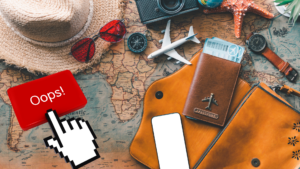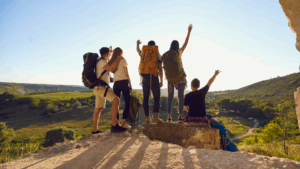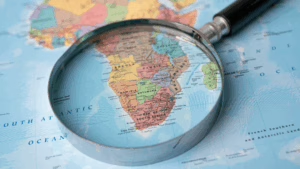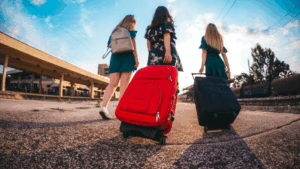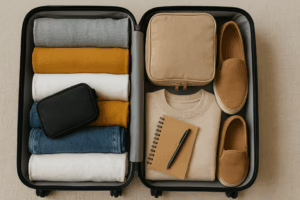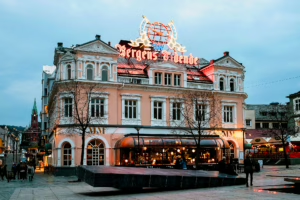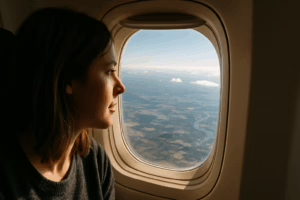Rethink What Travel Looks Like
The first key to budget travel is redefining what travel means. It is not all-inclusive resorts or five-star dinners. It is connection, curiosity, and the joy of discovery. Many of the world’s richest experiences, like hiking through Patagonia, watching the sunrise over Angkor Wat or dancing at a local festival in Oaxaca, don’t come with a high price tag.
Instead of hopping between ten cities in two weeks, focus on slow travel. Stay in one place longer to get better accommodation deals, cook your own meals, and explore the area in depth. This not only saves money but fosters a deeper cultural connection.
Traveling off-season is another smart move. You’ll get lower prices on flights and accommodations, fewer crowds, and more authentic interactions with locals. A trip to Greece in October or Japan in early December might offer a completely different but equally rewarding experience.
Flights: Flexibility Is Your Superpower
Airfare is often the biggest line item in a travel budget. But flight prices can vary wildly based on when and how you book.
The golden rule: Be flexible. Use tools like Google Flights, Skyscanner and Hopper to monitor fare trends and explore destinations based on your budget. Set price alerts and avoid flying on weekends or during holidays. Flying midweek can save you hundreds of dollars.
If you’re open-minded, try “anywhere” searches. Kayak Explore and Skyscanner’s “Everywhere” feature allow you to input your departure city and find the cheapest global destinations during your travel window. Sometimes, the best trips happen in places you didn’t expect to visit.
Also, consider budget airlines—but read the fine print. Carriers like Ryanair, AirAsia, and JetBlue offer cheap tickets but often charge extra for luggage, seat selection, and food. If you pack light and prepare ahead, they can be a smart choice.
Accommodations: Think Beyond Hotels
Hotels are convenient, but rarely the most cost-effective. Instead, consider alternative lodging options that stretch your budget and enrich your experience.
Hostels, especially in Europe, Southeast Asia, and South America, are a great place to meet other travelers and save money. Many now offer private rooms with en-suite bathrooms, so you don’t have to sacrifice comfort.
Platforms like Couchsurfing offer free stays with locals—an excellent way to gain cultural insight and potentially make lifelong friends. While it’s not for everyone, many travelers swear by it as one of the most rewarding parts of their journey.
House-sitting services such as TrustedHousesitters or MindMyHouse allow you to stay in someone’s home for free in exchange for pet care or basic maintenance. If you’re staying for several weeks or months, these platforms can significantly reduce your lodging costs.
For longer stays, monthly rentals through Airbnb or Booking.com often come with discounted rates. If you’re staying a week or more, reach out to the host directly to negotiate a lower price.
Eat Local, Not Luxe
One of the biggest travel myths is that eating well requires spending big. In reality, some of the most memorable meals come from markets, food stalls, and local eateries where chefs have perfected their recipes over generations.
Skip the touristy restaurants with English menus out front and look for where the locals line up. Street food in places like Bangkok, Mexico City or Istanbul is not only cheap but often safer than you’d think, as long as it’s hot, freshly made, and the stall is busy.
If your lodging includes a kitchen, shop at local markets and prepare your own meals. Cooking while abroad can be a fun way to learn about local ingredients, and it’s often healthier and far less expensive than eating out for every meal.
Apps like EatWith and MealSharing connect travelers with locals who host home-cooked dinners, giving you a cultural experience and a budget-friendly night out in one.
Transportation: Go Slow and Save
Getting from one place to another doesn’t always require a plane ticket. Trains, buses, rideshares and even ferries can offer more scenic and affordable ways to move around.
In Europe, consider using a Eurail Pass for train travel, or FlixBus for long-distance routes. In South America, bus networks are extensive and comfortable, and in Asia, overnight trains double as transportation and lodging.
In cities, opt for public transit over rideshares. Many urban metro systems are reliable, clean, and inexpensive. Apps like Moovit or Citymapper help you navigate unfamiliar transit systems with ease.
If you’re staying in a place for a while, consider renting a bike or scooter for local exploration. Not only does it cut costs, but it adds an element of adventure.
Get Paid to Travel (Yes, Really)
One of the most underutilized ways to travel on a budget is to work while you do it. Whether it’s teaching English, freelancing remotely, or volunteering, there are countless options that allow you to stay abroad longer while keeping expenses low, or even earning money.
Organizations like Workaway and Worldpackers connect travelers with hosts around the world in exchange for room and board. These opportunities might include teaching, farming, hostel work, or childcare.
If you have digital skills, consider freelancing while traveling. Websites like Upwork, Fiverr, and Toptal allow you to work from anywhere with a laptop and internet connection.
Teaching English abroad is another popular option. Countries like South Korea, Japan, and Vietnam offer programs with competitive salaries and free housing. Even teaching online through platforms like Cambly or Preply can give you the flexibility to work as you go.
Don’t Skip Travel Insurance
It might feel like an unnecessary expense when every dollar counts, but skipping travel insurance can cost you much more in the long run. A missed connection, stolen bag, or emergency hospital visit could derail your trip and your finances.
Many budget travel veterans recommend providers like SafetyWing or World Nomads, which offer affordable policies tailored for long-term or international travel. Check what’s covered—especially if you plan to rent vehicles or participate in adventure sports.
Some credit cards include travel protection if you book your trip with them, so read the fine print before purchasing a separate policy.
Smart Budgeting and Daily Habits
Creating a daily spending plan may not sound glamorous, but it gives you more control over your money and your freedom. Set a target budget per day and track it using apps like Trail Wallet, TravelSpend, or even a simple spreadsheet.
Break your budget into categories: lodging, food, transportation, entertainment, and extras. You’ll start to spot patterns and make smarter decisions, like skipping a third cocktail so you can afford a day trip.
Set aside an emergency fund, even if it’s just a few hundred dollars. Unexpected expenses are part of travel. A lost passport, medical need, or delayed flight can become a lot less stressful when you have backup cash.
Finally, know when to splurge. Budget travel isn’t about deprivation—it’s about choosing where to spend. Maybe you skip an expensive dinner so you can afford a hot air balloon ride in Cappadocia. Those decisions add up to a trip that feels rich in every way.
Free (and Almost Free) Activities That Enrich Your Trip
One of the best-kept secrets in travel is just how many unforgettable experiences are absolutely free. From museums with free-entry days to stunning hikes, festivals, and walking tours, budget travelers can tap into the soul of a city without paying a dime.
Many cities offer free walking tours led by passionate locals. While tips are encouraged, there’s no upfront cost, and you’ll often learn things that guidebooks miss. Cultural events, outdoor concerts, and art exhibitions are frequently free, especially in cities like Berlin, Buenos Aires, or Seoul.
Nature is the ultimate budget activity. Think snorkeling in Bali, watching wild horses in Portugal’s Serra da Estrela, or exploring national parks in the U.S. with an annual pass. Apps like AllTrails can help you find hikes of all difficulty levels.
Public spaces—markets, parks, beaches, temples, and historical squares—often hold the richest interactions. Watching a local chess game in Havana or joining a community Zumba class in a Manila park costs nothing but offers a priceless cultural connection.
Traveling on a budget doesn’t mean sitting in your hostel all day. With a bit of research, your days can be packed with enriching, wallet-friendly adventures that make you feel like a local rather than a tourist.
Use Travel Credit Cards and Loyalty Points Strategically
Travel credit cards can be game-changers when used wisely. Many offer generous sign-up bonuses, travel rewards, and perks like lounge access or free checked bags. When combined with strategic spending and point hacking, these cards can cover flights, hotels, and even upgrades.
Start by choosing a card that matches your travel style. For example, cards from Chase or American Express often partner with airline and hotel programs for flexible points. Use your card for everyday expenses—then pay it off in full each month to avoid interest.
Some cards also offer category bonuses (like 3x points on dining or travel), and rotating cashback offers. Pairing a travel rewards card with a budgeting app helps you stay on top of your spending while racking up miles.
Loyalty programs matter, too. Sign up for airline and hotel reward programs, even if you only fly them once. You may be surprised how fast points add up when combined with promotions, partner offers, or credit card bonuses.
While it takes a little learning, the payoff can be huge: a free round-trip flight, a week at a boutique hotel, or even a business-class seat, just for using the right card for your groceries or bills.
Connect With Fellow Travelers and Locals
One of the best parts of budget travel is the social connection it fosters. Hostels, group tours, co-working spaces, and apps like Meetup or Couchsurfing aren’t just budget-friendly—they’re powerful gateways to community.
Start by staying in social accommodations like hostels or guesthouses, which often organize free or low-cost events like city walks, cooking classes, or pub crawls. Even if you’re introverted, shared spaces like kitchens or lounges are great for casual conversations that can lead to travel tips or a new travel buddy.
Volunteering, group tours, and workshops (like salsa dancing or surf lessons) are also prime ways to meet people who share your interests. These connections often lead to shared costs on transport, group discounts, and valuable insights you won’t find online.
When it comes to locals, be curious and respectful. Learning a few words in the native language or asking someone for their favorite local dish shows genuine interest and often sparks warm exchanges.
Whether it’s a new friend from halfway across the globe or a local who invites you to their family meal, these human moments become the stories you remember most—proof that connection doesn’t cost a thing.
TL;DR: How to Travel the World on a Budget
- Travel slow and off-season to save more and experience deeper
- Use fare alerts and flight tools to find cheap flights—flexibility is key
- Stay in hostels, housesits, or book long-term Airbnb rentals at a discount
- Eat street food, shop local markets, and cook when possible
- Take buses, trains, and public transit instead of planes or taxis
- Explore volunteer, freelance, or teaching options to earn or save on the road
- Get travel insurance—it’s worth the peace of mind
- Track your daily spending and budget by category
- Know when to splurge to make your trip unforgettable
Budget travel isn’t a compromise—it’s a mindset. With a little research, creativity, and flexibility, you can make your dream of traveling the world a reality, without draining your bank account.




